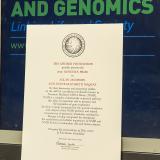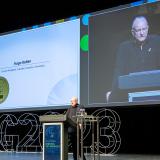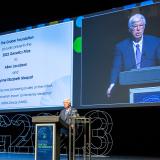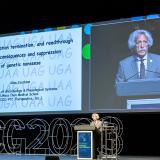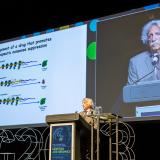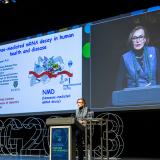2023 Gruber Genetics Prize
Molecular biologists Allan Jacobson, PhD, of the University of Massachusetts Chan Medical School, and Lynne Maquat, PhD, of the University of Rochester School of Medicine and Dentistry, are being recognized for their contributions in identifying and describing the mechanism of nonsense-mediated mRNA decay (NMD). This complex cellular pathway targets mRNA transcripts containing premature stop codons for degradation, thus preventing the formation of truncated, possibly toxic protein fragments.
2023 Genetics Prize Recipients
Laureate Profile
The pioneering contributions of molecular biologists Allan Jacobson, PhD, of the University of Massachusetts Chan Medical School, and Lynne Maquat, PhD, of the University of Rochester School of Medicine and Dentistry, have been pivotal in identifying and describing the mechanism of nonsense-mediated mRNA decay (NMD). This complex cellular pathway is responsible for targeting mRNA transcripts containing premature stop codons for degradation, thus preventing the formation of truncated, possibly toxic protein fragments.
Jacobson is being recognized for the genetic elucidation and analysis of the NMD pathway and related consequences of premature translation termination, while Maquat is being recognized for elucidating the mechanisms and cellular importance of NMD and NMD factors in human biology and human disease.
Jacobson, who started his career working on the model organism Dictyostelium discoideum, found that the half-lives of mRNAs changed during development. After making the switch to yeast, he was able to show that the decay rate for some mRNAs were dependent on whether or not they were translated, which suggested that there was something about the presence of a premature stop codon that caused an mRNA to be unstable. After collaborating with Michael Culbertson, who was working on frameshift mutations, they were able to discover the role of the UPF proteins in targeting mRNAs with premature stop codons for degradation.
In a number of follow up papers using the power of yeast genetics, they were able to describe and identify the core components of the NMD pathway, and to identify additional classes of mRNA substrates. As Jacobson and his research group continued their work, they were able to show the role that NMD plays as a cellular quality control pathway for multiple types of mRNAs in which the protein synthesis machinery encounters a premature stop codon.
Maquat, who is a mechanistic biochemist, transitioned from studying RNA synthesis in the bacteria Escherichia coli to studying hemolytic anemias in humans. Her studies on βo thalassemia, which is due to the absence of beta-globin protein, began her work on NMD. Patients with this disease have a faulty beta-globin gene, with a signal called a premature stop codon, that tells the cell to stop making the beta-globin protein subunit of hemoglobin before it is finished. In theory, this should have meant the cell made a partial version of the beta-globin protein. Instead, it simply didn’t make any detectable protein. It was this mystery that Maquat set out to solve.
Maquat demonstrated that beta-globin precursor RNA was efficiently processed to beta-globin mRNA, but beta-globin mRNA was unstable. When Maquat expanded her focus to include other hemolytic anemias, she found a similar pattern in those diseases as well. Maquat was able to show that the presence of a premature stop codon in these disease-causing alleles also led to the instability of the mRNA, in comparison to patients without the disease.
These observations, combined with further research, led to discoveries and mechanistic understanding of nonsense-mediated mRNA degradation in humans whereby mRNAs that contain a premature stop codon are targeted for degradation.
Maquat was also able to show that NMD plays an important role in ensuring the quality control of mRNAs produced in human cells, targeting mRNAs with premature stop codons, whether from a mutation or abnormal processing of precursor RNAs to mRNAs, for degradation. As Maquat and her team have also shown, NMD plays an important role in allowing human cells to adapt to environmental stressors. This includes the cellular inhibition of NMD to promote the death of breast cancer cells during chemotherapy, and the cellular inhibition of NMD to promote muscle-cell differentiation during muscle-cell development.
Watch Video
Citation
The Gruber Foundation proudly presents the 2023 Genetics Prize to Allan Jacobson and Lynne Elizabeth Maquat for their discoveries and pioneering studies on the mRNA surveillance mechanism known as Nonsense Mediated mRNA Decay (NMD). NMD is a complex evolutionarily conserved pathway that plays an important role in genetics and the regulation of gene expression. Jacobson is being recognized for the genetic elucidation and analysis of the NMD pathway and related consequences of premature translation termination. Maquat is being recognized for elucidating the mechanisms and cellular importance of NMD and NMD factors in mammalian cells and human disease.






